#Senegal Army
Text
youtube
#youtube#militarytraining#Senegal Military#Counterterrorism Training#War Games#Close Quarter Battle Training#Special Forces Training#Security Forces#Military Training#Army Training#Special Operations#Close Quarters Combat#Training Exercises#Military Exercises#Senegal Army#Military Operations#Flintlock 24#Tactical Training#Military Drills#Senegal Special Forces#African Special Forces#Combat Training
1 note
·
View note
Text
when your tomorrow's class started earlier in the morning and cannot decide whether to watch senegal against netherlands or miss it 😭😭😭
#literally i want to watch it tho but i'm too exhausted right now )));#anyways i'm on senegal side#okay but somehow there's de ligt in the netherlands nt and at the same time f1 made me hate the orange army so much#goddd please what kind of dilemma is this 😭😭
2 notes
·
View notes
Text




Tirailleurs Sénégalais and some French infantry of the Great War.
#Tirailleurs Sénégalais#history#miniatures#world war 2#military history#historic miniatures#world war 1#the great war#french army#french#france#colonialism#french colonialism#senegal
0 notes
Text
France begins reducing its military bases in West Africa
In the next few months, several hundred French soldiers are to be withdrawn from Gabon, Senegal and Côte d’Ivoire, Le Monde reports.
At most French bases in these countries, the process of reducing the number of military personnel has already begun, but it is expected to accelerate this year.
Until recently, the bases in Libreville and Dakar, the capitals of Gabon and Senegal, had 350 French troops, and in the capital of Côte d’Ivoire, Abidjan, 950 soldiers.
Under the plans, the number of French troops in the capitals of Gabon, Senegal and Côte d’Ivoire could be reduced to about 100 in each of the three cities, with them mainly in support roles.
The Elysée Palace said that the strategy of reducing France’s military presence in Africa had been on the cards since February 2023, which the French President Emmanuel Macron announced on the eve of a tour of the continent.
Read more HERE

#world news#world politics#news#europe#european news#european union#eu politics#eu news#france#france news#french politics#french news#french army#emmanuel macron#president macron#africa#west africa#gabon#senegal#cote d'ivoire
0 notes
Text
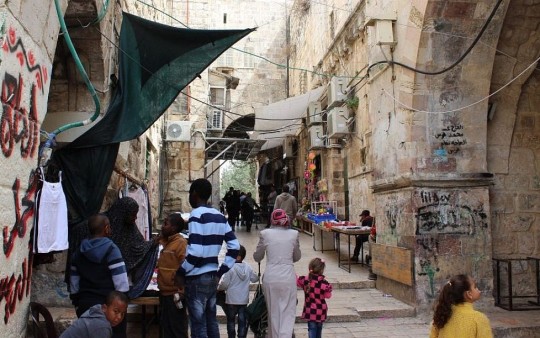
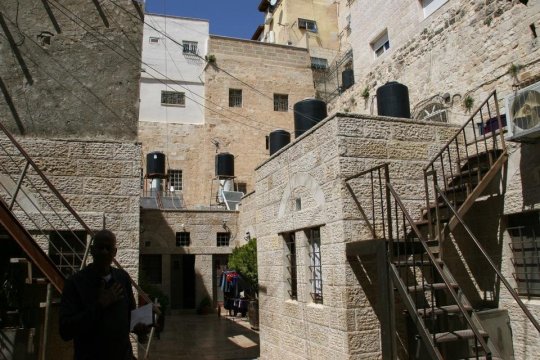
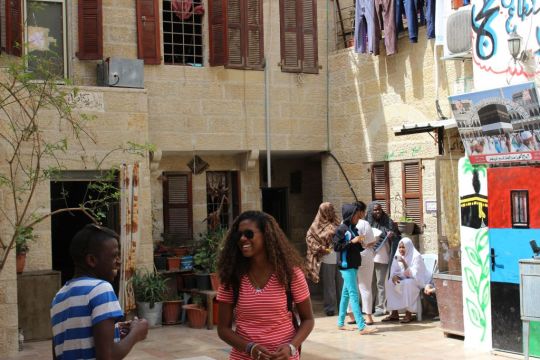
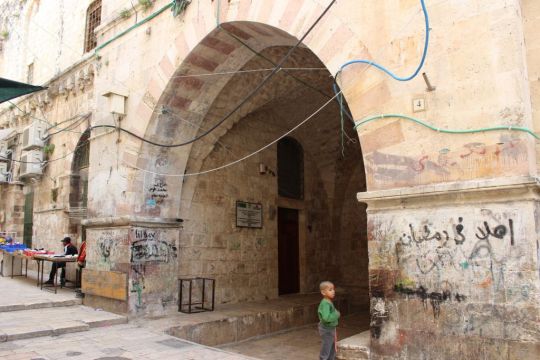
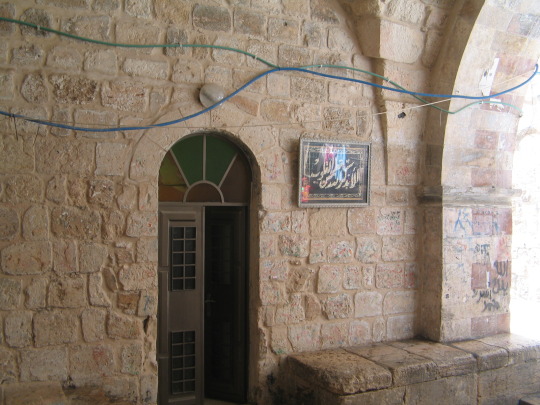
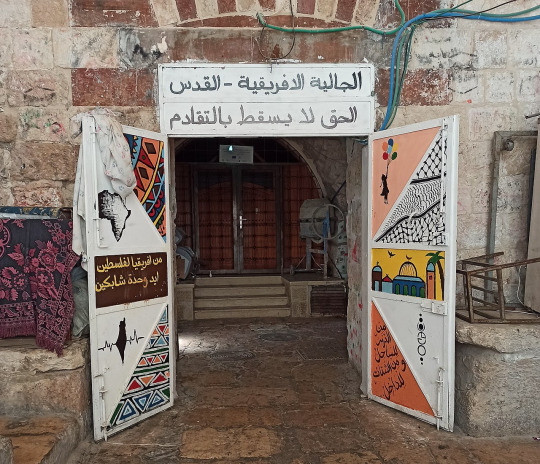
pictures from the old city of jerusalem's "african quarter", which comprises of ribat al-mansuri and ribat al-basiri. mamluks built the compounds in the late 13th century to house muslim pilgrims and the poor. ottomans used them as prisons, and the british closed the prisons when they occupied jerusalem in 1917. the ribats then came under the ownership of the islamic waqf, and were leased to the local afro-palestinian community.
afro-palestinians have an array of origins. like some other diaspora communities in palestine, some came through pilgrimage - al-aqsa was on their hajj path, and while many would visit to pray there, some decided to settle in jerusalem. there are also some who came to palestine enslaved or conscripted, most recently to ottomans. some came during the time of the british mandate, many as conscripted laborers to the british. afro-palestinians who can trace their ancestry do so to nigeria, chad, senegal, or sudan.
jerusalemite afro-palestinians were employed to guard al-aqsa throughout the ottoman period. during the 1948 palestine war, some joined the arab liberation army and fought with fellow palestinians to defend al-aqsa and their presence in jerusalem. the position of guards has been taken by occupation soldiers since the 1967 war, after which a quarter of the afro-palestinian population became refugees in surrounding countries.
jerusalem's afro-palestinian community still live in the compounds today, which also house the local african community society. (the door in the last picture is theirs.) afro-palestinians as a whole face the same legal, social, and economic restrictions and maltreatment as other palestinians, compounded with the same anti-black racism from israeli government and police which ethiopian jews and eritrean asylum seekers face, which result in a form of "passport racism" unique to them.
#palestine#architecture#muslim#diasporic palestine#my posts#see image description on 6th pic for translation#also worth mentioning that all four of the 'origin' countries are majority-muslim or had large muslim communities in case u didnt know#(though i wouldn’t doubt it if some nigerian or sudanese-palestinians came in the mandate era)#i feel like most of this blog's main demographic may know about sudan but maybe not the other three#there’s other black populations in pretty much every other me country who came for similar reasons#though pilgrimage is something really unique to palestine#and i’d guess also maybe modern day saudi arabia#though there’s large armenian communities in lebanon and syria who were established bc of pilgrimage to palestine
475 notes
·
View notes
Text
black & palestinian solidarities
if you support black liberation but are unsure of your stance on palestinian resistance, here’s a reminder that they are deeply intertwined. after the 1917 balfour declaration by the british government announcing the first support for a zionist state in palestine, zionism and israeli occupation of palestine have followed similar ideologies and practices to white supremacist settler colonial projects, so solidarity between black and palestinian communities has grown over time, seeing each other as fellow anti-imperialist and anti-racist struggles. (if you get a paywall for any of the sources below, try searching them in google scholar.)
palestinians have been inspired by and shown support for black liberationist struggles as early as the 1930s, when arabic-language newspapers in palestine wrote about the struggle by black folks in the united states and framed it as anti-colonial, as well as opposing the 1935 invasion by fascist italy of ethiopia, the only independent black african state at the time. palestinian support for black struggles grew in the 1960s with the emergence of newly-independent african states, the development of black and third world internationalisms, and the civil rights movement in the united states. palestinian writers have expressed this solidarity too: palestinian activist samih al-qasim showed his admiration for congolese independence leader patrice lumumba in a poem about him, while palestinian poet mahmoud darwish’s “letters to a negro” essays spoke directly to black folks in the united states about shared struggles.
afro-palestinians have a rich history of freedom fighting against israeli apartheid, where they face oppression at the intersections of their black and palestinian identities. some families trace their roots back hundreds of years, while others came to jerusalem in the nineteenth century from chad, sudan, nigeria, and senegal after performing the hajj (the islamic pilgrimage to mecca) and settled down. still others came to palestine in the 1940s specifically to join the arab liberation army, where they fought against israel’s ethnic cleansing of palestinians during the 1948 nakba (“catastrophe”). afro-palestinian freedom fighter fatima bernawi, who was of nigerian, palestinian, and jordanian descent, became, in 1967, the first palestinian woman to be organize an operation against israel, and subsequently the first palestinian woman to be imprisoned by israel. the history of afro-palestinian resistance continues today: even as the small afro-palestinian community in jerusalem is highly-surveilled, over-policed, disproportionately incarcerated, and subjected to racist violence, they continue to organize and fight for palestinian liberation.
black revolutionaries and leaders in the united states have supported the palestinian struggle for decades, with a ramp-up since the 1960s. malcolm x became a huge opponent of zionism after traveling to southwest asia and north africa (SWANA), publishing “zionist logic” in 1964, and becoming one of the first black leaders from the united states to meet with the newly formed palestine liberation organization. the black panther party and the third world women’s alliance, a revolutionary socialist organization for women of color, also supported palestinian resistance in the 1970s. writers like maya angelou, june jordan, and james baldwin have long spoken out for palestinians. dr. angela davis (who received support from palestinian political prisoners when she was incarcerated) has made black and palestinian solidarity a key piece of her work. and many, many more black leaders and revolutionaries in the united states have supported palestinian freedom.
while israel has long courted relationships with the african union and its members, there has been ongoing tension between them since at least the 1970s, when all but four african states (malawi, lesotho, swaziland, and mauritius) cut off diplomatic ties with israel after the 1973 october war. while many of those diplomatic relationships were reestablished in subsequent decades, they remain rocky, and earlier this year, the african union booted an israeli diplomat from their annual summit in addis ababa, ethiopia, and issued a draft declaration on the situation in palestine and the middle east that expressed “full support for the palestinian people in their legitimate struggle against the israeli occupation”, naming israeli settlements as illegal and calling for boycotts and sanctions with israel. grassroots organizations like africa 4 palestine have also been key in the BDS (boycott, divestment, sanctions) movement.
in south africa, comparisons between israel and south african apartheid have been prevalent since the 1990s and early 2000s. israel historically allied with apartheid-era south africa, while palestinians opposed south african apartheid, leading nelson mandela to support the palestinian liberation organization as "fighting for the right of self-determination"; over the years his statements have been joined by fellow black african freedom fighters like nozizwe madlala-routledge and desmond tutu. post-apartheid south africa has continued to be a strong ally to palestine, calling for israel to be declared “apartheid state”.
black and palestinian solidarities have continued into the 21st century. palestinian people raised money to send to survivors of hurricane katrina in the united states in 2005 (which disproportionately harmed black communities in new orleans and the gulf of mexico) and the devastating earthquake in haiti in 2010. in the past decade, the global black lives matter struggle has brought new emphasis to shared struggles. prison and police abolitionists have long noted the deadly exchange which brings together police, ICE, border patrol, and FBI agents from the united states to train with soldiers, police, and border agents from israel. palestinian freedom fighters supported the 2014 uprising in ferguson in the united states, and shared strategies for resisting state violence. over a thousand black leaders signed onto the 2015 black solidarity statement with palestine. the murder of george floyd by american cops in 2020 has sparked further allyship, including black lives matter protests in palestine, with organizations like the dream defenders making connections between palestinian and black activists.
this is just a short summary that i came up because i've been researching black and asian solidarities recently so i had some sources on hand; there's obviously so much more that i haven't covered, so please feel free to reblog with further additions to this history!
#free palestine#black liberation#black and palestinian solidarity#black and asian solidarity#original
642 notes
·
View notes
Photo
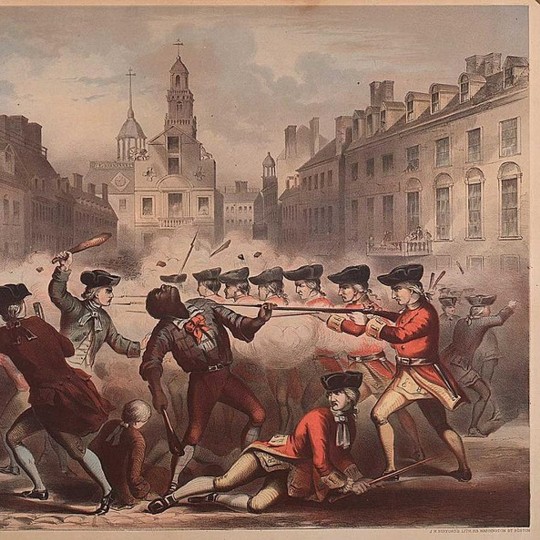
African Americans in the American Revolution
On the eve of the American Revolution (1765-1789), the Thirteen Colonies had a population of roughly 2.1 million people. Around 500,000 of these were African Americans, of whom approximately 450,000 were enslaved. Comprising such a large percentage of the population, African Americans naturally played a vital role in the Revolution, on both the Patriot and Loyalist sides.
Black Patriots
On 5 March 1770, a mob of around 300 American Patriots accosted nine British soldiers on King Street in Boston, Massachusetts. Outraged by the British occupation of their city, as well as the recent murder of an 11-year-old boy, the crowd was filled with Bostonians from all walks of life; among them was Crispus Attucks, a mixed-race sailor commonly thought to have been of African and Native American descent. When the British soldiers fired into the crowd, Attucks was struck twice in the chest and was believed to have been the first to die in what became known as the Boston Massacre. He is regarded, therefore, as the first casualty of the American Revolution and has often been celebrated as a martyr for American liberty.
Five years later, in the early morning hours of 19 April 1775, a column of British soldiers was on its way to seize the colonial munitions stored at Concord, Massachusetts, when it was confronted by 77 Patriot militiamen on Lexington Green. Standing in this cluster of militia was Prince Estabrook, one of the few enslaved men to reside in Lexington, who had picked up a musket and joined his white neighbors in defending his home. In the ensuing Battles of Lexington and Concord, Estabrook was wounded in the shoulder but recovered in time to join the Continental Army two months later. He was selected to guard the army headquarters at Cambridge during the Battle of Bunker Hill (17 June 1775) and was freed from slavery at the end of the war.
Attucks and Estabrook were just two of the tens of thousands of Black Americans who supported the American Revolution. There was no single motivation for their doing so. Some, of course, were inspired by the rhetoric of white revolutionary leaders, who used words like 'slavery' to describe the condition of the Thirteen Colonies under Parliamentary rule and promised to forge a new society built on liberty and equality. These words obviously appealed to the enslaved population, many of whom were optimistic that, even if slavery was not entirely abolished, they might receive better opportunities in this new nation. Others enlisted in the Continental Army to secure their individual freedoms, as the Second Continental Congress had proclaimed that any enslaved man who fought the British would be granted his freedom at the end of his service. African Americans also enlisted to escape the day-to-day horrors of slavery, to collect the bounties and soldiers' pay offered by recruiters, or simply because they were drawn to the adventure of a soldier's life. Additionally, several Black Americans were forced to enlist by their Patriot masters, who preferred to send their slaves to fight instead of going themselves.
Of course, not all Black Patriots served in the Continental Army or Patriot militias. Some, like James Armistead Lafayette, were spies; posing as a runaway slave, Lafayette was able to infiltrate the British camp of Lord Charles Cornwallis and procure vital information that helped lead to the Patriot victory at the Siege of Yorktown. The French general Marquis de Lafayette was impressed with his service and helped procure his freedom after the war, leading James Lafayette to adopt the marquis' name.
Other Black Patriots showed their support for the movement with their words. Phillis Wheatley was an enslaved young woman who had been brought to Boston from Senegal, where she had been seized. She was purchased by the Wheatley family, who quickly recognized her literary talents and encouraged her to write poetry. By the early 1770s, Phillis Wheatley was already a celebrated poet. She began to write extensively on the virtues of the American Revolution, praising Patriot leaders like George Washington. Despite his status as a slaveholder, Washington was moved by Wheatley's work and invited her to meet him, stating that he would be honored "to see a person so favored by the muses" (Philbrick, 538).
Continue reading...
67 notes
·
View notes
Text
😑😑😑

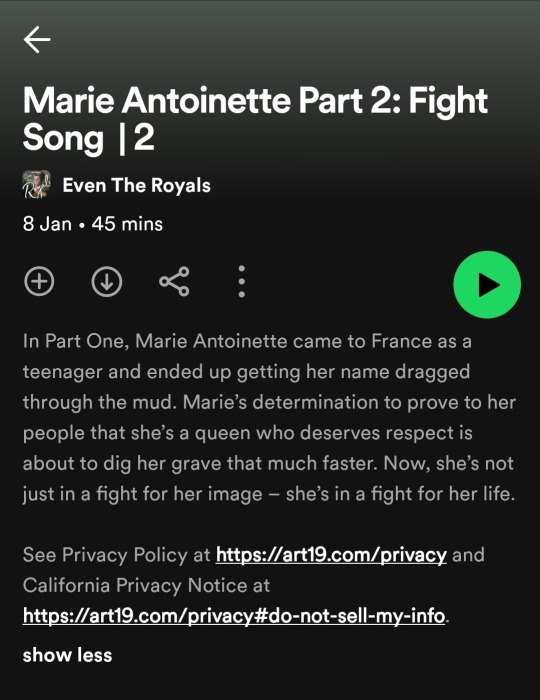
So sick and tired of this Marie Antoinette is actually a misunderstood "uwu" scapegoat narrative. The problem with pushing this narrative (esp by progressive White women like Kat Tenbarge 😑) is that in wanting to redeem her, it comes at the expense of erasing the irl people (many of whom were poor women, Black women etc) that she was complicit in oppressing becos ultimately, she's still a part of an oppressive class.
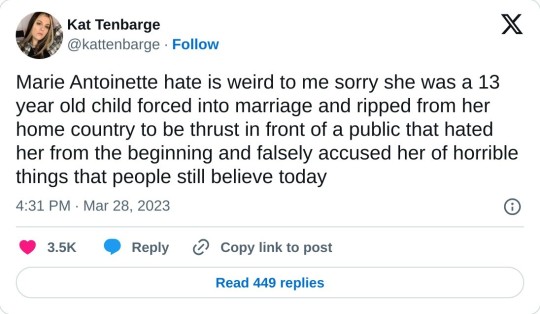
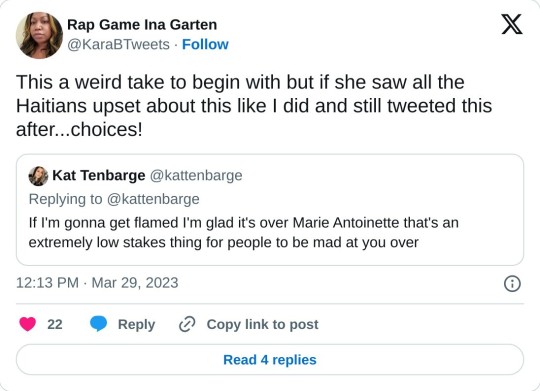
I'm so done with the whole "actually Marie Antoinette never said let them eat cake!" Yes, that's not true but do any of these pple acknowledge the actual questionable things the woman had done?
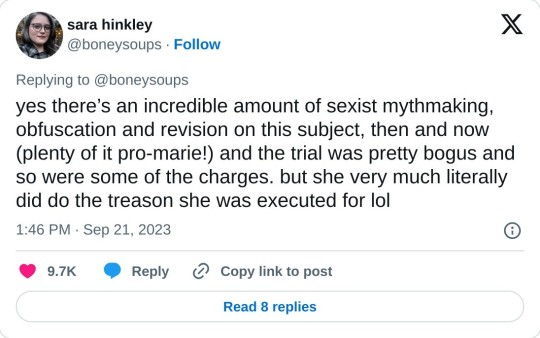
Like her complicity in igniting the American slave trade:
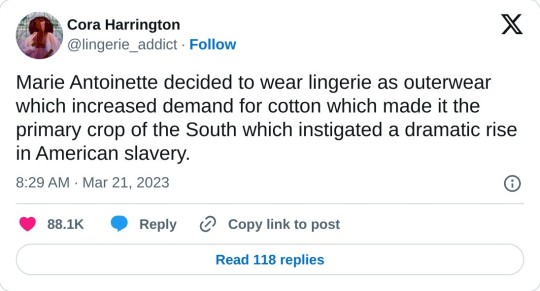
Or her "adopting" a Sengalese boy. Senegal in Marie Antoinette's lifetime was actively in the process of being colonised by France and other Western powers
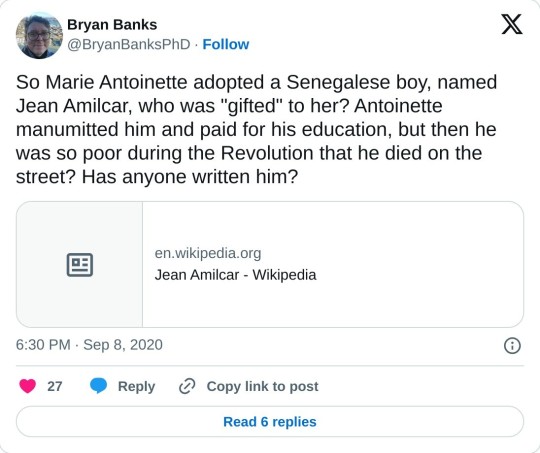
Or her and the other royals hyperconsumption of food and other luxuries while their people were starving:


Or her belief in her and the other monarchs' own divine right to rule:
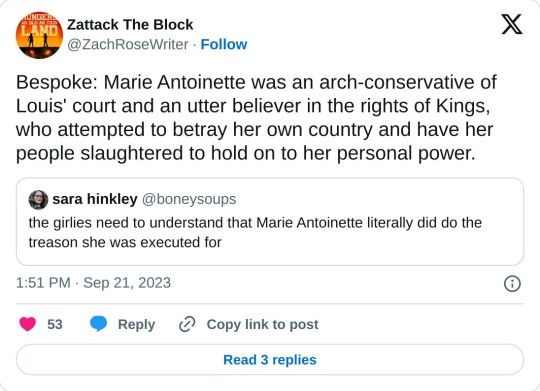
And she wrote letters to her family in Austria, begging them to send armies to crush peasant rebellions in France. She's a conservative through and through. But sure, she's wholly a misunderstood victim in all this 🤡
And there's the whole "she was sold into French court" narrative, which I never really was comfortable with. Becos slavery was, ya know, a thing:
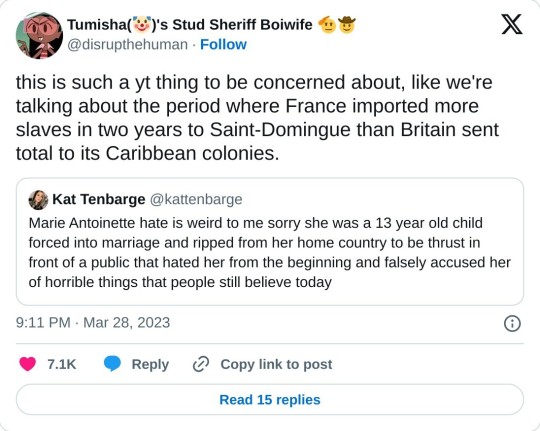
It's so weird that we are living in an era where we want to eat the rich, yet we are still promoting infantilized narratives of powerful wealthy historical figures.
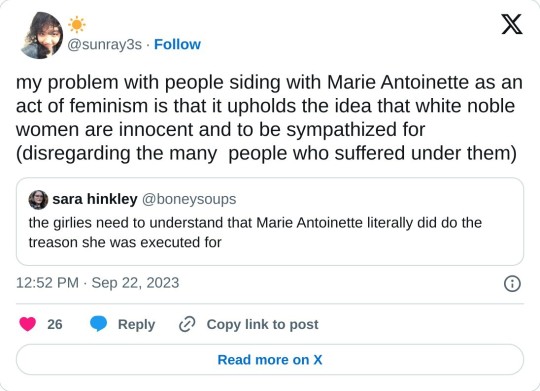
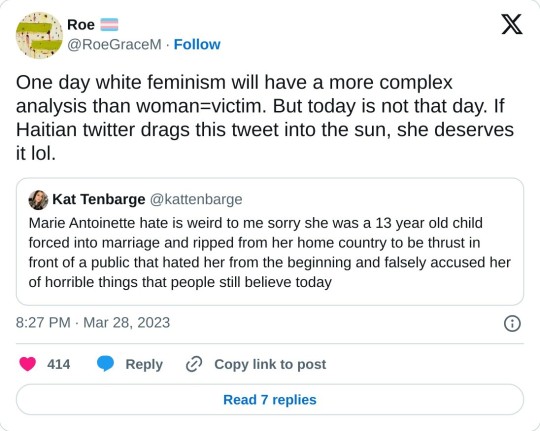
96 notes
·
View notes
Text
50+ African gods names and meanings - Tuko.co.ke

African communities have so many gods and goddesses, and each one has its own role to play in life. Some gods and goddesses are for wealth, war, health, healing, protection, death, evil, creation, and so on. Africans who believe in these gods consider it essential to worship and adore these gods and goddesses to have a good and smooth life.
Even though the larger religions such as Christianity and Islam have made big inroads in the African continent, the African gods and goddesses are still worshipped today. Here are the names of African gods:
African god of war
Ogun - Ogun is a god of war who defends the Yoruba tribe and is depicted wearing armor and red eyes.
Kibuka - Kibuka is the Buganda god of war who secures victory in war by taking the form of a cloud, which hovered above his enemies and rained spears and arrows.
Age-Fon - During the days of wars and battles, Agé was called upon to protect and give strength to the warriors, leading them on which paths to take.
Menhit - The war goddess was believed to advance ahead of the Egyptian armies and cut down their enemies with fiery arrows.
Tano - He is the goddess of war and strife for the Ashanti people.
Apedemak - The Nubian lion-headed warrior god.
Takhar - He is the god of justice or vengeance. He is a demi-god in Senegal's Serer religion and is worshipped to protect believers against injury, bad omens, and abuse.
Maher- Ethiopian god of war
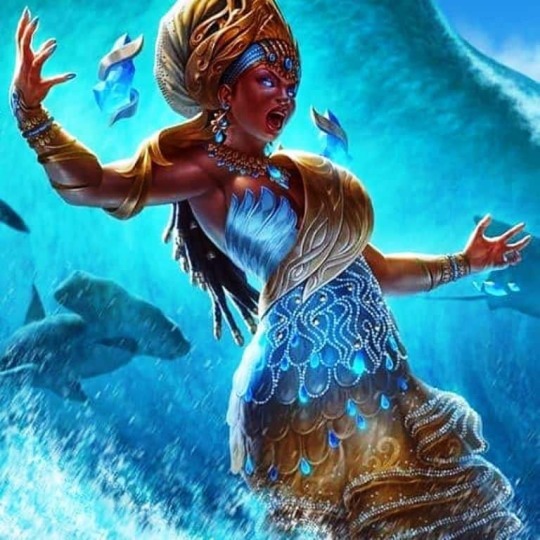
Shango - Shango is the Yoruba god of war and thunder. Oral tradition describes him as powerful, with a voice like thunder and a mouth that spewed fire when he spoke.
Oya - She is the wife of Shango. Oya is a ferocious and protective deity worshipped by the Yoruba. She is the goddess of wind, thunderbolt, and fire.
African god of wealth
Mukasa - He is the brother of Kibuka, the god of war. His main oracular sanctuary was found on an island in Lake Victoria. This god provides rain, food, and cattle.
Oko - Oko is the god of agriculture and fertility. He came to Earth and lived on a small farm, growing some of the most beautiful and delicious fruits and vegetables.
Olokun - Olokun is believed to be the parent of Aje, the orisha of great wealth. He gives great wealth, health, and prosperity to his followers.
Aje - Aje is a traditional goddess of abundance and wealth, often associated with the business of the marketplace in the Yoruba religion.
Oshun - Oshun is a divine being associated with love and fertility, as well as financial fortune in the Yoruba religion.
Ikenga - Ikenga is a personal god of human endeavor, achievement, success, and victory. He is grounded in the belief that a man's power to accomplish things is in his right hand.
Anyanwu - This is the goddess of the sun. She is revered as the goddess that promotes productivity, hard work, and overall positive well-being.
Njoku Ji - This is the guardian deity of yam in Igboland. She is prayed to for productivity during the farming season.
Mami Wata - Mami Wata is famous as the African god of money. The goddess has the power to bestow good fortune and status through monetary wealth.
Wamala - He is the god of wealth and prosperity.
Anayaroli - He is the god of wealth.
Ashiakle - She is a famous goddess of wealth and prosperity in West Africa.
Abena - She is known as the river goddess. Her name is associated with gold, brass, as well as with other wealth symbols.
African god of healing
Agwu - Nsi - This is the god of health and divination. This god is one of the basic theological concepts used to explain good and bad, health and sickness, poverty, and wealth in Igboland.
Osanyin - He is the Yoruba Orisha of herbalism, and he possesses the powers to cure all diseases.
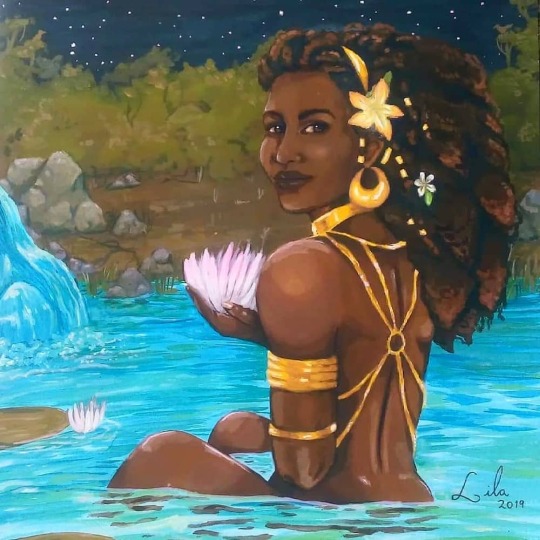
Xu - He is the sky god of the Bushmen in South Africa. Xu is usually invoked during an illness.
Aja - Aja is a powerful healer in Yoruba legend. It is said that she is the spirit who taught all other healers their craft.
Babalu Aye - Babalu Aye is an Orisha often associated with plague and pestilence in the Yoruba belief system. Just as he is connected with disease and illness, he is also tied to its cures.
African evil gods
Amadioha - This is the most popular god in Igboland. He is the god of thunder & lightening. Amadioha is considered a gentleman among the deities and the cruelest when annoyed.
Adroa - Adroa is the god of death with two characters: good and evil. His body is split into two. One half is short and black, which represents evil, while the other half is tall and white and depicts goodness.
Gaunab - He is the Xhosa and Khoikhoi evil god. He is responsible for all misfortune, disease, and death.
Modimo - He represents all the good things. Yet, in the same breath, he had the power to destroy things and bring about natural disasters and devastation.
Ogo - He is the chaos god among the Dogon. Ogo is a horrifically awful trickster god, the embodiment of chaos, and a rebel of horribleness.
African god of death
Anubis - Anubis, the guardian of the dead, is one of the most well-known Egyptian gods. He's mainly depicted as a dog-like figure and leads the dead to Ma'at, where their hearts are weighed.
Ogbunabali - Literally meaning "the one that kills at night." He is known as the death deity. Ogbunabali is known to kill violently.
Gamab - Gamab lives in the sky and directs the fate of mankind. When it's time for someone to die, Gamab gets out his bow and shoots them down with an arrow.
Oya - She is also a goddess of death. Oya is the guardian of the gates of death, as she helps the dead in their transition from life.
African god of creation
Mbombo - Mbombo is the creator god in the mythology of the Kuba people. It is believed that Mbombo was alone, darkness and primordial water covered all the earth. He felt an intense pain in his stomach and then vomited the sun, the moon, and stars.
Olorun - He is the ruler of the sky and the creator of the sun.
Obatala - He is the creator of humans, mountains, valleys, forests, and fields.
Unkulunkulu - He grew from reeds and brought with him people and cattle. Upon his own creation, he created the earth and all of its creatures.
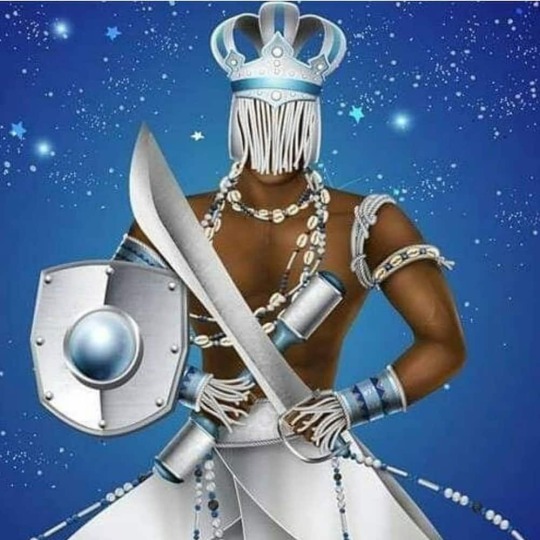
Ra - The sun god arose from Nun, a chaotic body of water that was the only thing in existence. He independently gave birth to Shu, the god of air, and Tefnut, the water goddess. They then produced Geb and Nut, the god of the earth and the goddess of the sky, respectively. The first humans to exist were from Ra's tears.
Kaang - He is the creator god of the universe, according to the San people.
Nana - Buluku - Nana Buluku is the mother of Mawu-Lisa and the goddess of creation. She is associated with the sun and moon.
Odomankoma - This is the name Akan-language speakers use to describe the eternal entity who deserves the credit for the work of creation, including creating the concept of trinity.
Modjaji - She is a South African goddess of rain whose spirits live in a young woman's body. The goddess is considered a key figure as she can start and stop the rain.
African god of fertility
Ala - She is the most respected god in Igboland. The goddess represents the earth, fertility, creativity, and morality.
Oshun - She is one of the most powerful of all orishas in the Yoruba religion. She is associated with water, purity, fertility, love, and sensuality.
Asase Ya - Asase Ya is the Earth goddess of fertility of the Ashanti people of Ghana. She is the wife of Nyame, the Sky deity, who created the universe.
Mbaba Mwana Waresa - She is the Zulu goddess of fertility.
Denka - He is the Dinka god of fertility.
Yemaya - She is the childbirth goddess in the Yoruba religion. She is considered the mother of all since she is the goddess of the living ocean.
Who is the most powerful African god?
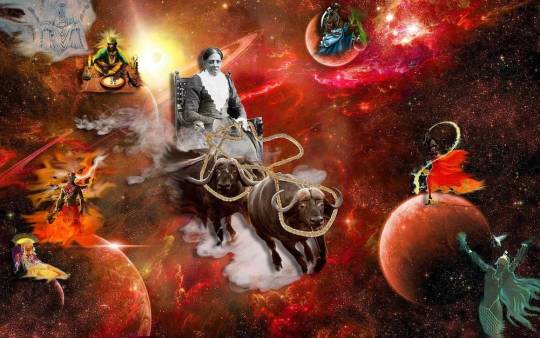
Oshún is a Yoruba orisha, daughter of Yemoja, a Nigerian river goddess. She is the protector of the family and pregnant women. Oshun is typically associated with water, purity, fertility, love, and sensuality. She is considered one of the most powerful of all orishas in the Yoruba religion. She possesses human attributes such as vanity, jealousy, and spite.
There you have it. A comprehensive list of African gods' names and meanings. With the introduction of larger religions such as Islam and Christianity, the concept of African deity is slowly losing its meaning. However, some ethnic communities still believe in and worship these gods and goddesses even today.
Tuko.co.ke published an article about the list of major religions in Africa. Before the white man came to Africa, the African people had a doctrine. Little is known about the ancient African religions. However, it is a fact that all doctrines have common features such as belief in a supernatural power, the belief of life after death and the beliefs surrounding burial.
Research shows that the majority of citizens in Nigeria and Africa as a whole are devoted Christians. The African continent has a variety of religions practised across all regions. In Africa, religiosity has a big influence on arts, culture, lifestyle and traditions of its people.
15 notes
·
View notes
Text

Chadian soldiers rest in the shade of their WMA301 Fire Support Vehicles near Malam Fatori following the retaking of the town from Boko Haram, April, 2015.
The WMA301 is a Chinese export vehicle produced by NORINCO. It is similar in role to the People's Liberation Army's PTL02, but has a larger caliber gun as opposed to the PTL02's 100mm gun. It features thermal imaging, a NATO compliant 105mm gun, and a high degree of mobility due to it being based on the wheeled WZ551 chassis. The WMA301 was ordered by Cameroon, Chad, Djibouti, Myanmar, and Senegal, and primarily serves as a fire support vehicle, firing on targets and fortifications from a distance supporting infantry and other armored vehicles.
22 notes
·
View notes
Text
Senegal on the left, Japan on the right.
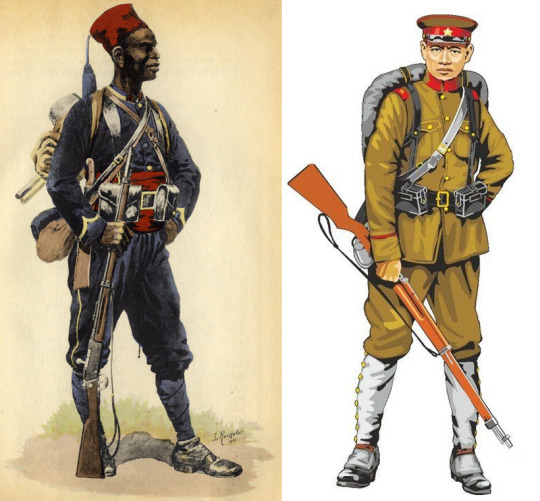
The Senegalese riflemen were the main component of the 'Black Army', as opposed to the 'Orient Army' or 'African Army' stationed in the colonies but mainly composed of white soldiers. About 200,000 of them fought in the First World War. Not all of them were from Senegal, but they were rather recruited from the entirety of sub-saharan Africa. Many villages in Africa were forced to send out a certain number of men, though the village chief often chose which ones would leave for service. The promise of a good pay, good food and French citizenship was one of the motivators for enlistment.
When the war broke out in 1914, Japan saw an excellent occasion to invade the German territories in the Pacific and defy their Navy. It contributed greatly to the war effort, by sending out medical battalions to the Western Front, helping the British army with suppressing the German forces, and even with shutting down Indian revolts. Eventually, it fulfilled a great deal of military orders for its allies which helped prosperity in the nation.

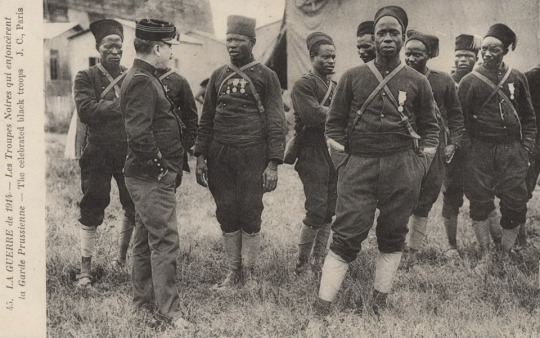
72 notes
·
View notes
Text
youtube
#youtube#militarytraining#International Cooperation#Military Collaboration#Brazilian Troops#Troop Coordination#Senegal Military#Senegal Forces#Polish Troops#Troop Exercises#Tactical Driving#Military Training#Military Maneuvers#Army Training#Military Stunts#Military Drills#Senegal Army#Extreme Driving#High Speed Driving#Military Skills#Driving Stunts#Extreme Stunts#Panama City#Counterterrorism Operations#Fuerzas Comando 24#Panama#Showdown#Military Tactics#Special Forces
0 notes
Text
[Al Jazeera is Qatari State Media]
Minutes after Gabon’s electoral commission announced on Wednesday that President Ali Bongo Ondimba had won a third term in office, senior military officers announced a coup and annulled the election results.
According to local media reports, Brice Clothaire Oligui Nguema, the commander-in-chief of the Gabonese Republican Guard – the country’s most powerful security unit – and a cousin to Bongo, is the ringleader of the attempted coup.[...]
Nguema is one of the most influential and enigmatic figures in the country today. The son of a military officer, he trained at the Royal Military Academy of Meknes, in Morocco.
Nguema then served as Bongo’s “aides-de-camp” to a commander in former President Omar Bongo’s Republican Guard, until the former Gabonese leader’s death in 2009.
When Omar Bongo’s son Ali Bongo rose to power in October 2009, Nguema was sent to Morocco and Senegal for diplomatic missions. A decade later, he took over as the head of the guard.[...]
Besides military and diplomatic duties, Nguema was seen as entrepreneurial and also believed to be a millionaire in Gabonese circles.
According to a 2020 investigation by The Organized Crime and Corruption Reporting Project (OCCRP) on the Bongo family’s assets in the United States, Nguema invested in real estate, paying in cash.
“He bought three properties in middle- and working-class neighbourhoods in the Maryland suburbs of Hyattsville and Silver Spring, just outside the capital, in 2015 and 2018. The homes were purchased with a total of over $1 million in cash,” the OCCRP report said.[...]
In an interview with French daily Le Monde on Wednesday, Nguema [said the following]
“Beyond this discontent, there is the illness of the Head of State [Ali Bongo suffered a stroke in October 2018 which left him weakened]. Everyone talks about it, but no one takes responsibility. He did not have the right to serve a third term, the Constitution was violated, the method of election itself was not good. So the army decided to turn the page, to take its responsibilities,” Nguema said.
He added that Ali Bongo can retire and continue to enjoy his rights like every other Gabonese citizen, adding that the generals would meet to decide on a successor to Bongo at 14:00 GMT on Wednesday.[...]
Gabon’s soldiers have apparently begun celebrating Nguema.
Unverified videos and images on social media showed a group of soldiers dancing with Nguema and calling him Gabon’s “next strongman.”
30 Aug 23
21 notes
·
View notes
Text
Acta non verba. Chi governa e controlla il Niger (per non parlare dell'Africa intera, ma lo vedremo poi). Due più due fa sempre quattro. Perché?
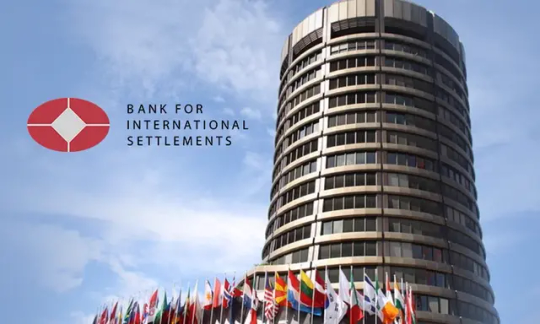
Dobbiamo sottolineare anche che questo signore, oltre ad essere il governatore della Banca centrale del Niger (BCEAO) e ad essere un membro del WEF è membro anche della Commisione Trilaterale (Rockefeller)? Oppure la finiamo con le menzogne?

L'Africa, come il resto del mondo è colonia dell'usurocrazia. Il resto sono palle per fuorviare la gente disinformandola, mera propaganda. Thomas Sankara DOCET! 1 https://bis.org/country/ne.htm
2 https://bceao.int/en/content/instruments-monetary-policy-implementation…
Togo-Burkina Faso-Côte d'Ivoire -Guinea Bissau -Mali -Niger-Senegal-Togo
----------------------------------------------------------------------
Queste sono le vere armi per non farsi prendere per il culo.
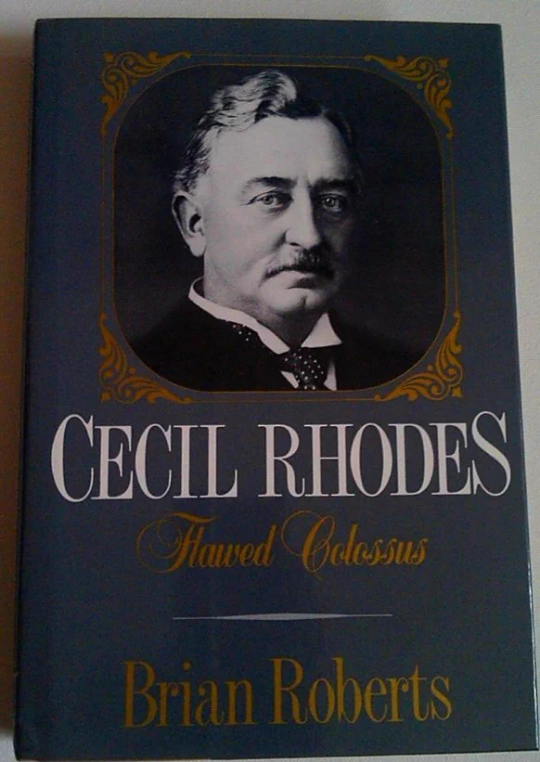

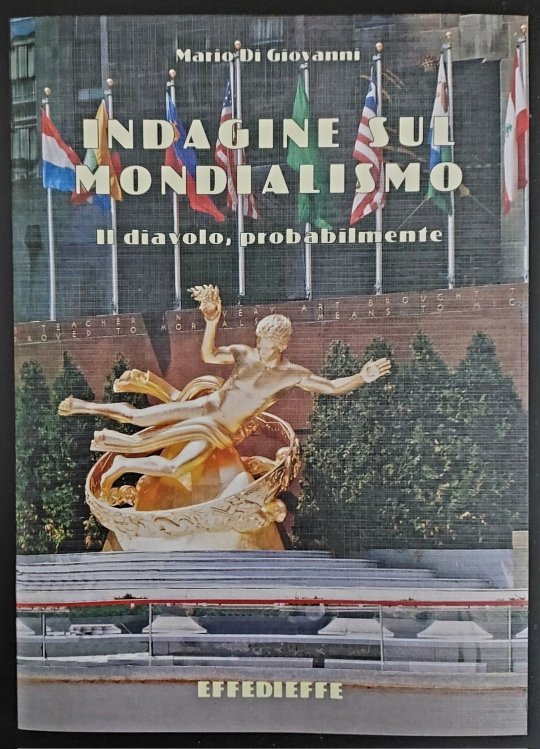

Andrea @Andre_Neo89
17 notes
·
View notes
Text
List of Arabization:
[PDF page 5] The agenda advances in four stages. Firstly, Islam is introduced as a religion in the targeted area or country. Secondly but concurrently, Arabic is introduced as a language, purportedly to enable converts to read the Koran but with the hidden purpose of destroying the indigenous languages of the targeted people. Thirdly, Arab culture is introduced to obliterate indigenous cultures of the targeted people. Lastly, biology is employed with the purpose of changing the very biological make up of the population by the lightening of the black skin through continuous procreation with lighter skinned Arabs.
https://epubs.ac.za/index.php/jasas/article/view/1631/1164
Mauritania:
“Everything is Arabized!” exclaimed Yacouba Diakite, secretary general of the Mauritanian National Union of Students (NEMS).
+
The Mauritanian army was “cleansed” of its Black Mauritanian officers in the late 80s, alongside the expulsion of some 100 000 Black-Mauritanians from their own country, revealed Alain Antil, an associate researcher and director of sub-Saharan Africa programs at the French Institute of International Relations (IFRI) and a doctor in political geography.
https://www.afrik-news.com/article17330.html
Arabization took place much more easily in culture than in the financial and accounting sectors, but progress in computer technology
https://www.degruyter.com/document/doi/10.1515/9783110628869-014/html?lang=de
In addition to slavery, they fight against the forced Arabization that entailed the expulsion of tens of thousands of black Africans from the country in 1989 and the ethnic cleansing of the army in 1990-1991.
https://merip.org/2002/06/mauritanian-activists-struggle-against-slavery/
In the late 1980s, the Mauritanian government initiated a policy of "Arabization" and expelled some 70,000 non-Arab citizens.
https://www.justiceinitiative.org/litigation/ihrda-v-mauritania
Tensions between the proponents of a fully arabized Mauritanian society and a minority of French-speaking Mauritanians have existed since the country gained its independence from France in 1960
https://observers.france24.com/en/20100330-francophone-students-protest-against-arabization-reforms
Mauritania – Arabization or negrification?
https://rapideinfo.mr/mauritania-arabisation-or-negrification/
Senegal:
As it will be shown, the Arabisants intend to stand as new political entrepreneurs of the Arabophone Muslim community, to challenge the hegemony of Sufi Brotherhoods, and consequently, to question the state’s alliances with Sufi orders.
+
Muslims adopting an ‘Arabized versioning of Islam legitimize their religious practices through knowledge of the Arabic language and the capacity to read the Qur’an in its original form. Claims to knowledge are equivalent to claims of orthodoxy or claims of privileged access to religious orthodoxy’ (Leblanc, 1999)
https://mariebrossier.com/wp-content/uploads/2020/04/Brossier_2016_Senegal_Arabic_literates_MP.pdf
Senegalese struggle “to create their own Arab and/or African identity
https://muse.jhu.edu/article/778420
The development of brotherhoods led by marabout helped Senegal to resist Arabization in conjunction with Islamization
https://berkleycenter.georgetown.edu/posts/jennifer-lang-on-islam-in-senegal
Iraq:
During the Iran-Iraq War, the Anfal campaign destroyed many Kurdish, Assyrian and other ethnic minority villages and enclaves in North Iraq, and their inhabitants were often forcibly relocated to large cities in the hope that they would be Arabized.
https://en.wikipedia.org/wiki/Arabization#%3A%7E%3Atext%3DDuring_the_Iran-Iraq_War%2Cin_the_years_1991%E2%80%932003.?wprov=sfla1
Libya:
According to the organization Freedom House, Libya's "arabization policies discriminate against Berber and Tuareg peoples outside of Libya's ethnic mainstream and threaten their culture" (Freedom in the World 1998-99).
https://www.refworld.org/docid/3ae6ad631c.html
Part of his Arabization campaign aimed to supplant minority languages such as Tamazight with Arabic.
https://www.genocidewatch.com/de/single-post/gaddafi-s-linguistic-genocide-in-libya
Libya's Amazigh were among the first to rebel against Qaddafi, who banned the use of Berber languages in the name of Arabization
https://www.csis.org/analysis/spreading-word-libyas-berber-language-revival
According to the organization Freedom House, Libya's "arabization policies discriminate against Berber and Tuareg peoples outside of Libya's ethnic mainstream and threaten their culture" (Freedom in the World 1998-99).
https://www.refworld.org/docid/3ae6ad631c.html
Part of his Arabization campaign aimed to supplant minority languages such as Tamazight with Arabic.
https://www.genocidewatch.com/de/single-post/gaddafi-s-linguistic-genocide-in-libya
Libya's Amazigh were among the first to rebel against Qaddafi, who banned the use of Berber languages in the name of Arabization
https://www.csis.org/analysis/spreading-word-libyas-berber-language-revival
Bosnia:
In addition to the recent developments, the capital and the surrounding areas have witnessed what can be defined as a phenomenon of “Arabization” of the public space: store signs and banners written in Arabic have made their appearance in different parts of the capital and in other areas of the country. In Sarajevo examples of such kind are found in the central Baščaršija, BBI shopping mall, and especially in Ilidža, where real estate and tourist agencies, cafeterias, restaurants, hotels, souvenir shops and dentists all advertise in Arabic.
https://iris.unive.it/retrieve/e4239dde-47ab-7180-e053-3705fe0a3322/Bosnia_and_Herzegovina_the_influence_of.pdf
India
This process of shunning of an existential reality and donning a new one is a mark of appropriation of a culturally alien world order, affected by strict regimentation – imported from the religious culture of Arabs. Gradually, it has become aspirational and desirable to sound, dress, pray and behave like an Arab
https://indiafoundation.in/articles-and-commentaries/arabization-of-indian-muslims/
Somalia:
Agree, we need to take small steps to reverse the creeping arabization under the impression of religion
https://www.reddit.com/r/XSomalian/comments/wxijiv/this_is_what_is_happening_in_somalia_since_1991/
Sudan:
Although not all Muslims in the region were Arabic-speaking, acceptance of Islam facilitated the Arabization process
https://en.wikipedia.org/wiki/Islamization_of_the_Sudan_region
The Sudanese government also promoted a policy called "ta'rib," or "Arabization," that sought to make Arabic the standardized language across the country
https://www.wilsoncenter.org/blog-post/the-history-behind-sudans-identity-crisis
Millions of civilians living in the conflict regions have been forced to relocate to Khartoum, a city where there is the misconception that Sudanese Arabs are considered true Sudanese, whereas Sudanese Africans are seen as subordinates, and where a preference for lighter skin exists
Indeed, the two phenomena have been very often closely—but rather uncritically—associated in a wide array of academic texts referring either to the long-term historical process that has made Sudan into a largely Arabic-speaking and Muslim society in the modern era (MacMichael 1967 [1922]; Hasan 1967; Abd al-Rahim 1970; Grandin 1997) or to a specific set of Sudanese state policies meant to Arabize and Islamize Southern populations after 1956 (Nyombe 1997; Poggo 2002; Sharkey 2012).
Ethnographic work has also shown that identification with Islam and the adoption of “Arab” practices among Lafofa people in the Nuba Mountains in the 1980s were part of economic strategies rather than strictly religious processes of conversion (Manger 2002).
13Islamization measures were undertaken as soon as the Southern Policy was abrogated. After travel restrictions between the two regions were lifted in 1947, many Southerners sought to work in the North; they were often forced to convert to Islam to find a job (ʿAlī Ṭāhā 2004: 243)
But the Arabs’ adherence to Islam gave the latter “moral ascendancy over the more backward Sudanese” (MacMichael 1934, quoted in Spaulding & Kapteijns 1991: 143).
“The official tendency to regard these as two processes is misleading. It is a cultural process and every pagan area that becomes permanently arabicized becomes permanently islamized” (Trimingham 1949: 245, n. 1)
https://journals.openedition.org/etudesafricaines/32202?lang=en
In a book entitled Al-ḥaraka al-fikriyya fī al-Sūdān: ilā ayna yajibu an tattajiha? (“The Intellectual Movement in Sudan: In What Direction Does it Have to Go?”), published in 1941, he wrote:
In every place where Islam spread, Arabic literature and Arabic culture inevitably spread too. So did the Book of God the Bountiful, the Sunna of God’s Messenger and the Noble Tradition, all these in the Arabic language. […] Sudan’s fate was that the Arabic language spread in its quarters first to propagate Islam among its people, second because Arab blood is dominant among its inhabitants. […] The influence of the Islamic religion and the Arab culture in this country is most visible in the works of men of letters from the previous generation (Maḥjūb 1941: 15-16).
In 1958, a military coup brought General Ibrahim Abboud (1900–1983) to power. Abboud emerged as a keen supporter of both Arabisation and Islamisation. His government immediately opened six intermediate-level Islamic ma’hads (seminaries) in southern Sudan, and went on to open many khalwas (village Qur’an schools) that were later recognised as government primary schools. Four years later, in 1962, his regime expelled all foreign Christian missionaries on the grounds that they were hindering national integration and aiding southern rebels (Republic of the Sudan, Ministry of the Interior 1964:3, app. B; Voll 1997). The year 1962 also witnessed a strike among southern Sudanese students, who protested the government’s Arabisation policies.
https://sci-hub.se/https://doi.org/10.1111/sena.12009
Indonesia:
Saudi Arabia Quietly Spreads its Brand of Puritanical Islam in Indonesia
https://www.voanews.com/a/saudi-arabia-quietly-spreads-its-brand-of-puritanical-islam-in-indonesia-/3679287.html
But recent years have seen rising Islamic conservatism in Indonesia, a trend that some scholars have called the “Arabisation” of Indonesian Islam
https://indonesiaatmelbourne.unimelb.edu.au/talking-indonesia-the-salafi-movement/#:~:text=But%20recent%20years%20have%20seen,of%20the%20post%2Dauthoritarian%20era.
The 'Islam of the desert' has made inroads across the Indian Ocean
+
This process of homogenization and regimentation—a process I would like to call the Arabization of Islam—puts greater emphasis on rituals and codes of conduct than on substance, through the Wahhabi and Salafi creeds, a rigidly puritanical branch of Islam exported from, and subsidized by, the Kingdom of Saudi Arabia
https://www.jstor.org/stable/45072987
As Salafism has expanded, some Indonesia have become alarmed at what they call the "arabization" of their country and called for an Islam with freedom of opinion and tolerance, that does not reject pluralism and democracy
https://en.wikipedia.org/wiki/International_propagation_of_Salafism_and_Wahhabism_by_region
Resisting Salafism and the Arabization of Indonesian Islam: a contemporary Indonesian didactic tale by Komaruddin Hidayat
https://link.springer.com/article/10.1007/s11562-017-0388-4
The genetic Arabization of Sudan was thus already occurring centuries ago. The camel culture of the Beja is essentially an Arabian import. Very early Arabic inscriptions can be found in eastern Egypt and Arab tribes are mentioned as being in Egypt and southwards centuries prior to Islam.
The Banu Kunuz and Juhayna and various other Arab tribes were already inside Nubian borders much earlier than we expect.
https://www.somalispot.com/threads/phenotype-can-be-misleading-when-it-comes-to-genotype.59569/page-6
Malaysia:
Malaysia's growing ties to Saudi Arabia — and its puritan Salafi-Wahhabi Islamic doctrines — are coming under new scrutiny as concerns grow over an erosion of traditional religious practices and culture in the multiethnic nation.
+
Two annual beer festivals were cancelled after Islamic leaders objected
https://www.japantimes.co.jp/news/2017/12/23/asia-pacific/arabization-malaysian-religion-culture-comes-spotlight/
Malaysia with Arabization and Salafism-Wahhabism
https://www.degruyter.com/document/doi/10.1355/9789814786843-013/html?lang=en
Malaysia's 'Arabization' Owes to Saudi Ties
https://journal.uinjkt.ac.id/index.php/studia-islamika/article/view/25213
Malaysia’s Constitution calls for the rights of all to practice their faith in peace and harmony but, increasingly, today the ideal of religious tolerance is being threatened by what many see as the “Arabization” of Malaysian Islam.
https://www.ispu.org/what-does-moderate-mean-in-malaysia/
Worries about Malaysia's 'Arabisation' grow as Saudi ties strengthen
https://www.reuters.com/article/idUSKBN1EF108/
Nigeria:
It intensifies the urge to identify and sound Arab, to Arabize by going beyond the names of pious figures found in Islam. Naming today in the region is informed by the fancies of Arab sounding names that are often unconnected to people’s realities, identities, and personal and collective histories.
https://link.springer.com/article/10.1007/s41297-023-00185-z
This long contact with Islam has planted the religion in all aspects of life among the Hausa Muslims. This was foregrounded in the Islamization efforts of successive polities across hundreds of years. This was accompanied by Arabization—the slow but steady infiltration of Arab culture in many aspects of life including naming systems, mode of dressings, and many other quotidian experiences. However, the naming system is the aspect most affected by the desire to be Arabic. Most Hausa people retain much of their modes of dressing (Alhassan et al., 1988, p. 6)
https://link.springer.com/article/10.1007/s41297-023-00185-z
The two issues are the rights of children and secondly the fact that at this moment there are two Nigeria’s – the northern Sharia states and the rest of the country and the former is increasingly removing itself from the Federal structure and picking and choosing which Federal and international laws it will uphold and those it will ignore.
https://globalvoices.org/2010/05/20/nigeria-a-debate-on-pedophilia-sharia-law-and-the-two-nigerias/
Mali:
Tuareg in Sebha protest Mali “ethnic cleansing”
https://libyaherald.com/2013/02/23187/
Increasing numbers of Malian women are being r-ped by Tuareg rebels and armed groups that have swept across the north of Mali since the beginning of year, expelling all government troops from the region.
https://www.ipsnews.net/2012/04/armed-groups-in-northern-mali-raping-women/
2 notes
·
View notes
Text
In August 1958, Charles de Gaulle, who had just returned to power in France, set off on a tour of his country’s sub-Saharan African colonies. His purpose was to present them with a plan to join France in a new kind of “community.” Paris would continue to control what it called “state services,” which included defense, monetary matters, customs, as well as media and communications. A new quasi-limited autonomy, meanwhile, would more or less allow African countries to manage their domestic affairs and to carry the costs, once largely borne, by France of doing so.
De Gaulle presented the novel scheme under a veneer of magnanimity. Via a planned referendum, its African possessions would be given the liberty to accept or reject his community. This offer did not come without a warning though. There would be no debate, only an up or down vote, and any colony that rejected the proposition would face secession from France “with all its consequences.”
It was not long before the world learned what this meant in practice. When de Gaulle visited Guinea the following month, that colony’s leader, Ahmed Sékou Touré, spoke defiantly to a crowd as the French statesman looked on. “We do not and never shall renounce our legitimate right to independence,” he said. This angered De Gaulle, who canceled a planned dinner with Touré that night and disinvited him to fly together on his presidential plane to nearby Senegal the next day. Yet these were but the merest hints of the consequences to come.
After de Gaulle had returned home to Paris, he ordered the immediate withdrawal of the thousands of the French civil servants who had made the colony’s bureaucracy run and staffed its clinics and schools. And before they flew home, many of the French workers engaged in an orgy of petty destructiveness, smashing furniture, trashing official records, breaking equipment, and even shattering lightbulbs.
What happened back then in Guinea is one of most famous episodes in an inglorious history of French colonial rule and domination over large parts of West and Central Africa, but it is only a single chapter in a very long story. Guinea is a better place than most to begin a discussion of this topic because in the 1880s and 1890s, the era of rapid French imperial expansion in the region, it was the site of a fierce campaign by Paris to subdue local political rulers, seize control over gold and other natural resources, and extend France’s authority over new territories.
The most famous of these leaders was a man named Samory Touré, who ruled over a polity called the Wassoulou Empire. Its core was in the Guinea highlands, and to France’s great frustration, it sometimes fielded armies numbering as many as 35,000 soldiers. When his empire was finally subdued just before the close of the century, Touré was exiled to an island in Gabon, a faraway equatorial colony (now country), where he died.
France is of course not the only European country to have ruled over Africans, but its history is unique for its persistence, its geographic spread, and its adaptability. A struggle for independence in Algeria, then a large North African French settler colony, brought down France’s Fourth Republic and threatened a civil war in the heart of Europe in 1958, the same year as de Gaulle’s sub-Saharan tour. That is because of the fantastical claim by the rebellious French general, Raoul Salan, that Algeria was actually a physical part, or geographical extension of France. “The Mediterranean traverses France the way the Seine traverses Paris,” Salan claimed.
In the wake of events in Guinea and Algeria, when other Black African figures began to push for more autonomy than de Gaulle had envisioned, or worse, for outright independence, bad things tended to happen to them. A little remembered anti-colonialist figure from Cameroon named Félix-Roland Moumié, for example, was assassinated by French agents whose actions anticipated the dark methods of Vladimir Putin. They poisoned him with radioactive thallium in Geneva in 1960.
More than 60 years later, there is a remarkable uprising against French influence underway in the Sahel, one of the African regions where French domination has been most thorough over the decades. One after another, the leaders of three states in this semi-arid region—Niger, Burkina Faso, and Mali—have spoken out against French sway in West Africa and moved to reduce or eliminate the presence of French soldiers, corporations, and diplomats in their countries. In doing so, they have blamed Paris for a host of problems, ranging from a long-running but ineffective and often disruptive French-led campaign to contain the spread of Islamic insurgencies in the Sahel, to interference in their domestic politics, to profiteering from starkly unequal economic ties.
In stiff rebuffs of France, these three landlocked countries, which rank among the poorest in the world, have sometimes welcomed a larger role for Russia, both in helping bolster their internal security and in the extraction of mineral wealth like the gold and uranium in their soils. And with Russia (as with France for so long) these two things often go together.
They have also hinted at ending cooperation with France on controlling the northward flow of African migration across the Sahara toward Europe. And they have been discussing exiting a long-standing monetary union and currency, the CFA franc, which was created by France prior to independence mostly as a way of sustaining French exports in the region. African critics of the CFA franc have long said that it perpetuates French domination, in part through its historic requirement that member countries of the union deposit their foreign reserves with the French treasury. The three states are even discussing establishing a new Sahelian currency to replace the CFA.
The military president of Niger, Abdourahmane Tchiani, has called for France to pay damages to longtime African client states like his for years of what he has likened to looting. In Burkina Faso, next door, another military leader, Ibrahim Traoré, has vowed never to allow his country to be dominated by Europeans again.
In so strongly calling into question relations with France, these three Sahelian countries have captured the imagination of millions of Africans living in other former French colonies and beyond, including in wealthier coastal states, whose official relations with France so far have not been seriously disrupted. To the clear chagrin of French President Emmanuel Macron, though, this has come to feel increasingly like a major reckoning.
Some in France have long seen this coming. In an interview in 2007, his last year in power, former French President Jacques Chirac said as much. “Don’t forget one thing, and that is that a large portion of the money that we have in our purses comes precisely from the exploitation of Africa over the centuries … So we need a little measure of good sense, I didn’t say generosity, but good sense, and justice to render to Africans, I would say, what we took from them. This is necessary if we want to avoid the most severe turmoil and difficulty, with all of the political consequences that this will bring in the near future.”
In fairness to France, with all there is to criticize, its entire legacy in sub-Saharan Africa has not been uniformly abysmal. France once oversaw the construction of large infrastructure projects in its African colonies and clients—major ports, railroads, and highways. Part of the current anger toward this former colonial power is that it has largely exited this business, ceding the realm of big projects to China.
A few of France’s former colonies, Ivory Coast in particular, are well developed by the standards of the region. Even the much-criticized CFA franc has not been thoroughly bereft of benefits, hence its staying power. The relationship with France, and through Paris, with the European Union, has long kept the CFA convertible and relatively stable, if typically overvalued—affecting the balance of trade by making these countries exports expensive and imports, notably from the Eurozone, cheaper.
Surveying Africa below the Sahara in its entirety, though, it is hard to avoid the impression that France’s former colonies generally trail their former British colony counterparts in economic development, in democratic governance, and in political stability. And this is no paean to British colonial rule or influence, which gradually dissipated after independence.
But even if one wishes to take the most benign view of colonialism and capitalism in Africa, it is hard to argue that France has done nearly enough to help foster development in its former possessions or usher them more fully into the global economy. And to some extent, this stands to reason. France, at best, is a medium-size country with a matching economy. These attributes stand in disproportionate relation to Paris’s grand and long-standing ambition of buttressing its own stature in the world by clinging to the reins of neocolonial power in the continent to the south. Africa’s galloping demographic growth makes the absurdity of this mismatch more evident by the year.
On one level, the ongoing uprising against Paris in the Sahel can be understood as a cynical ploy using populism to sustain the political power of military elites in states that have been flirting with failure for years. But there is something much more interesting going on.
There is another challenge being posed by the leaders of Burkina Faso, Mali, and Niger that is likely to be far more impactful over time: they are challenging other African countries—both French and English speaking—to tear down the barriers that cripplingly divide them. More than a century ago, Europe “broke” the continent by subdividing it into cookie cutter-shaped countries, many of them small and landlocked.
Deeper African unity and federation is a dream with a surprisingly long pedigree. This was the cry of African intellectuals like J.E. Casely Hayford, in the former Gold Coast, now Ghana, early in the 20th century. More famously, it was also the obsession of Ghana’s first president, Kwame Nkrumah. Less well-remembered, this was also the cause of Barthélemy Boganda, the early leader of the Central African Republic, who hoped to federate French-speaking countries in that part of the continent under a proposed United States of Latin Africa.
What remains certain today is that a start toward the greater prosperity and well-being that all Africans yearn for will only come when these divides are eradicated, and outsiders can’t do this for them. Anger towards France is only useful if it becomes a catalyst for greater agency by Africans, who build their own regional currencies, construct their own regional rail and highways, and constitute political and economic unions that exist on more than paper.
2 notes
·
View notes